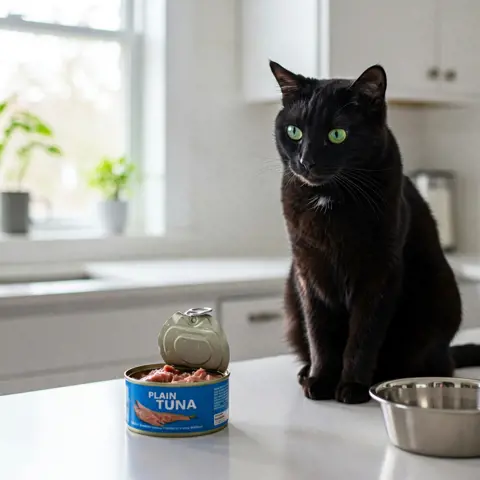Can Cats Eat Lemon Pepper Tuna? Vet-Inspired Advice on Safety and Nutrition

How We Ensure Accuracy
At CatsLib, we take the accuracy of the information we provide very seriously. Our content is created and reviewed by experts to ensure that every piece of advice is not only helpful but also based on the latest veterinary research. Here’s how we make sure the information you read is reliable:
- ✔ Content reviewed by experts
- ✔ Based on up-to-date expert-reviewed veterinary sources
- ✔ Reviewed regularly for relevance and accuracy
In This Article
Understanding Lemon Pepper Tuna: Ingredients and Nutrition FactsIs Lemon Pepper Tuna Safe for Cats?
Health Risks and Symptoms: Lemon Pepper’s Effect on Cats
Safer Tuna and Fish Alternatives for Cats
Vet Recommendations and Expert Advice on Feeding Tuna to Cats
Conclusion
Tuna is a classic treat for many cats. But when it comes to flavored varieties like lemon pepper tuna, things get more complicated. While cats may go wild for the smell, the real concern is whether lemon pepper tuna is safe for cats or if the spices and citrus could be harmful.
If you’re wondering, can cats eat lemon pepper tuna, the short answer is—it's best to skip it. Ingredients like lemon and pepper aren’t just extra flavor; they can be risky for your cat’s health. Knowing what’s safe is key to keeping your pet happy and healthy. If you’re curious about other fishy treats for your cat, see how different types stack up in our guide on can cats eat sardines in tomato sauce and learn what to look for before sharing your next snack.
Understanding Lemon Pepper Tuna: Ingredients and Nutrition Facts
Before scooping even a flake of your lunch into your cat’s bowl, it helps to know exactly what’s lurking in lemon pepper tuna. Most flavored tuna products pack extra seasonings, salt, and sometimes hidden ingredients your feline should avoid. Here’s a closer look at what you’ll typically find inside that can, why certain components can put your cat at risk, and how to make sense of all those nutrition labels when it comes to your pet.
Common Ingredients in Lemon Pepper Tuna

If you scan the label on a typical can of lemon pepper tuna, you’re likely to spot ingredients such as:
- Tuna (sometimes chunk light, sometimes albacore)
- Lemon juice or lemon flavoring
- Black pepper
- Vegetable oil or water
- Salt (often a lot)
- Other seasonings (like garlic or onion powder, which are extra harmful to cats)
- Preservatives
For humans, these flavors make a great lunch. For cats, every added ingredient increases risk. In the wild, cats wouldn’t be crunching on peppercorns or sniffing lemons—they’re built to eat plain meat without frills.
Is Lemon or Citrus Dangerous for Cats?
Lemons and any type of citrus fruit are bad news for cats. The oils and chemicals in citrus, such as limonene and linalool, are toxic to felines. Ingesting even a small amount can lead to symptoms of citrus toxicity, which may include:
- Drooling
- Vomiting
- Diarrhea
- Tremors or weakness
- Skin irritation (sometimes from contact)
Cats have sensitive systems when it comes to plant-derived oils, and lemon essence or flavorings don’t get a pass. If you’re wondering “can cats eat lemon pepper tuna” or even “is lemon bad for cats,” the answer is a firm no—especially due to the lemon. Even if there’s just a hint of lemon, it’s best to skip products with any citrus flavor for your curious friend. If your cat seems interested in strange foods or your snacks, our guide to cat behavior issues can help you understand these habits.
Is Pepper Safe or Toxic for Cats?
The “pepper” part of lemon pepper tuna is another red flag. While black pepper isn’t considered as toxic as citrus, it still isn’t good for cats. Black pepper can irritate a cat’s mouth, throat, and digestive tract. Eating foods flavored with pepper frequently may cause:
- Stomach upset
- Sneezing or coughing
- Discomfort and even vomiting if enough is ingested
Cats don’t have a natural tolerance for spices. They lack the enzymes needed to break down spicy compounds safely. In some cases, even smelling pepper can lead to sneezing fits. When thinking about “is lemon pepper harmful to cats,” remember both main ingredients can spell trouble.
Sodium and Seasoning Levels: A Risky Combo
Lemon pepper tuna products tend to be high in salt and full of seasonings. While humans have a higher salt tolerance, cats do not. Felines are easily overwhelmed by too much sodium, leading to issues such as:
- Dehydration
- Increased thirst or urination
- Kidney stress or even kidney failure with repeated exposure
The extra seasonings—beyond lemon and pepper—are another hazard. Ingredients like garlic and onion powders (often found in “flavored” products) are highly toxic for cats, sometimes at even trace amounts. Never give seasoned, store-bought tuna mixes to your cat.
For a safer treat, stick to tuna that’s packed in water with no added salt or flavor. If you’re looking for a deep dive into what tuna is best for cats, check out our resource on cats and other tuna options.
Plain is the name of the game when it comes to treats—leave the lemon pepper to your own lunch.
Is Lemon Pepper Tuna Safe for Cats?
Lemon pepper tuna might seem like a tempting snack to share with your cat, but a closer look at what happens after your feline swipes a bite will make you think twice. Flavored tuna, especially with added spices and citrus, is packed with ingredients that don’t mix well with kitty’s sensitive digestive system. Let’s walk through the potential effects and widen the lens to see how all seasoned tunas stack up when it comes to safe feeding.
What Happens if a Cat Eats Lemon Pepper Tuna?

If your cat sneaks a bite of lemon pepper tuna, the effects can range from a mild tummy upset to a real emergency, depending on how much is eaten and your cat’s size or health. While some cats might just experience minor discomfort, the risks are nothing to brush off:
Immediate symptoms:
- Drooling or pawing at the mouth (from the bitterness of lemon or strong pepper)
- Sneezing or coughing if pepper is inhaled
- Vomiting or diarrhea, sometimes just a few hours after eating
Delayed or more serious effects:
- Lethargy or weakness (if toxicity sets in)
- Signs of citrus toxicity, which can include confusion or tremors
- Skin irritation, especially for sensitive cats
Lemon in any form—juice, zest, or flavor oil—contains compounds that are unsafe for cats. Over time, frequent exposure to citrus or excess salt in seasoned tuna may stress the kidneys, cause dehydration, or aggravate underlying health issues. If your cat already has kidney problems or sensitive digestion, even a small serving could do more harm than good.
If your cat eats a noticeable amount of lemon pepper tuna and starts showing signs like vomiting, shaking, or unusual tiredness, call your vet right away. Quick action helps prevent a bad situation from getting worse. For tips on unusual food-seeking and what drives your cat’s nosy eating habits, take a look at the advice in our cat behavior section.
Is Seasoned or Flavored Tuna Harmful to Cats?
The trouble with lemon pepper tuna isn’t just about lemon and pepper. All seasoned or flavored tuna varieties—think tomato basil, hot chili, or even herbed blends—carry their own set of risks for cats. Extra seasonings mean more chances for harmful ingredients, like:
- Excess salt
- Garlic or onion powder (both toxic to cats)
- Artificial flavors or preservatives
When people ask, "can cats have flavored tuna" or "is seasoned tuna bad for cats," the answer is clear: it’s best to avoid all forms of seasoned or flavored fish. Even small amounts can cause trouble because a cat’s body isn’t built to process spices, seasoning blends, or preservatives.
Feeding seasoned sardines or other flavored fish to cats can lead to the exact same health issues as lemon pepper tuna. Symptoms might start with minor digestive upset, but there’s always a risk of lingering health problems, especially if your cat gets into these foods more than once.
It’s always tempting to share a special treat, but for cats, plain is the gold standard. Stick to unseasoned, water-packed tuna if you feel like giving a fishy flavor—these carry fewer risks and are much easier on your cat’s delicate body. If you want to know more about treats that are safe for cats (and which ones to avoid), don’t miss our other guides on can cats eat for easy-to-use information.
Staying a step ahead with your cat’s health means reading every label and skipping anything with added flavor. Your furry friend may not thank you with words, but you’ll see the pay-off with a happier, healthier cat.
Health Risks and Symptoms: Lemon Pepper’s Effect on Cats
Cats are curious by nature, and the scent of something as flavorful as lemon pepper tuna can draw their attention right away. But when it comes to cats eating lemon pepper tuna, safety is a real concern. Citrus and pepper, both featured in this seasoned fish, can impact your cat in ways that are more serious than just a little stomach upset. If your cat sneaks a bite, it’s important to watch for telltale signs that something is off. Here’s what every cat owner should know about the risks and symptoms linked to flavored tuna treats.
Symptoms of Citrus and Pepper Toxicity in Cats
Lemon and black pepper may seem harmless in your kitchen, but your cat’s body disagrees. Citrus fruits like lemons contain chemicals and essential oils (think limonene and linalool) that are quite toxic to felines. Even small amounts can set off a chain reaction in their bodies. Pepper, while not as threatening as lemon, can still cause trouble.
Watch for these clear warning signs if your cat may have eaten lemon pepper tuna:
- Excess drooling – A cat exposed to citrus often reacts by drooling more than usual.
- Vomiting or diarrhea – The most common reaction, sometimes appearing within a few hours.
- Lethargy or unusual tiredness – Your cat may appear low energy or sleep more than normal.
- Tremors – In severe cases, citrus toxicity can lead to shaking or trembling.
- Loss of appetite – If your cat snubs food, something could be wrong.
- Skin irritation – If your cat came in contact with lemon oil or zest, their skin or mouth might become red or inflamed.
- Coughing or sneezing – Pepper can irritate a cat’s nose and throat, causing fits of sneezing or coughing.
Think of these symptoms as your cat’s way of waving a red flag. Unlike people, cats can’t tell us what hurts, so spotting these signs early is key. Not every cat will show the same symptoms, and not all reactions are instant. If your cat has a habit of eating your food, check out tips on setting healthy boundaries with common cat behavior solutions.
When to Call a Vet if Your Cat Eats Lemon Pepper Tuna: Practical Advice
If you catch your cat munching on lemon pepper tuna, don’t panic—but don’t ignore it either. Some cats handle a tiny taste without much trouble; others can get sick fast. Here’s a simple guide on when professional help is a must:
- Immediate symptoms: If your cat is vomiting, trembling, drooling a lot, or seems disoriented, call your vet without delay.
- Persistent symptoms: If issues like diarrhea, loss of appetite, or lethargy last more than a few hours, it’s time to seek help.
- Underlying health conditions: If your cat has kidney problems, is very young or old, or is already on medication, be extra cautious.
- Amount consumed: A lick may not cause a crisis, but eating a big chunk of seasoned tuna could. When in doubt, a quick call to the vet is always the smartest move.
Don’t feel like you’re overreacting—your cat’s health is worth it. Keep the can and label on hand to show your vet, as this helps pinpoint what your cat ate. Clinics can offer advice over the phone or tell you what to watch for. For more on what's risky and how to keep your cat safe with human foods, you’ll find answers in our guide to safe foods for cats.
Knowing when flavored tuna is dangerous and recognizing symptoms early is a big step in protecting your pet. If your cat has ever snuck food off your plate, you’re not alone—staying informed keeps your furry friend out of the vet’s office and right where they belong: healthy and at home!
Safer Tuna and Fish Alternatives for Cats
If you’re thinking twice about sharing lemon pepper tuna with your cat, you’re already one step ahead in keeping your furry companion safe. It’s clear that seasoned tuna—especially those loaded with lemon, pepper, and extra salt—has more risks than rewards when it comes to cat health. But that doesn’t mean your cat has to miss out on tasty fishy treats altogether. There are safer options that let you treat your pet without worrying about spices or artificial ingredients. Plus, with a few healthy alternatives from your own fridge, you can offer variety and nutrition without risking your cat’s well-being.
Can Cats Eat Plain Tuna?

Plain tuna, served straight from the can and packed in water, is the only kind most vets consider safe as an occasional treat. Cats absolutely love the smell and taste of plain tuna, and it can be a great motivator if you’re trying to coax a finicky eater or give medicine. Still, tuna should never become a daily diet staple—think of it as your cat’s version of dessert.
Keep these safety tips in mind:
- Choose tuna packed in water, not oil. Oil-packed tuna is fattier and can give your cat a stomachache or even lead to pancreatitis if fed often.
- Skip salt and additives. Stick to low-sodium or no-salt-added versions.
- No flavorings, sauces, or spices. Even plain tuna labeled with lemon essence or other seasonings is off-limits for cats.
- Serve small amounts. A spoonful once a week is usually fine for most healthy adult cats. Too much tuna can unbalance your cat’s nutrition, leading to problems like vitamin E deficiency or, in rare cases, mercury buildup.
Every cat is different. If you notice any odd behavior or symptoms after offering tuna, stop immediately and check with your vet. Curious about other fishy foods? Find detailed guidance on can cats eat sardines in tomato sauce for a smart comparison of common cat treats.
Alternative Treats: Healthy Human Foods for Cats
Cats don’t have to miss out on special snacks just because they can’t share your seasoned tuna. There are plenty of safe, healthy human foods that make perfect treats for felines. If you want to keep treat time both delicious and nutritious, try these simple options:
- Steamed or boiled chicken (no spices or skin)
- Plain cooked fish like salmon or whitefish (unseasoned and boneless)
- Small cubes of plain cooked turkey
- Bits of scrambled egg (plain, cooked through, no oils or butter)
- Small amounts of plain pumpkin (not pie filling)
Always introduce new foods slowly and in tiny amounts. Some cats have sensitive stomachs or allergies to foods you wouldn’t expect. Treats should complement, not replace, your cat’s regular diet. For a roundup of what’s safe and what should stay off the menu, explore the full list at can cats eat.
If your cat is a persistent beggar for human snacks, it might be worth looking into their motivation. Sometimes, persistent “begging” hints at behavioral quirks or unmet needs—if you’re dealing with a determined dinner thief, find tips for managing these situations in advice from our section on food-related cat behavior issues.
Let treat time stay happy and stress-free by serving safe options and steering clear of anything flavored for humans. Your cat may not understand why you’re skipping the lemon pepper, but their good health will be all the thanks you need.
Vet Recommendations and Expert Advice on Feeding Tuna to Cats
When you’re weighing the risks of giving your cat lemon pepper tuna, expert guidance matters. Many cat owners assume if a little bit isn’t causing drama, it must be harmless. But veterinarians and feline nutritionists take a firmer stance: not all tuna is created equal, especially when it comes loaded with flavors like lemon and pepper. In this section, we’ll break down clear recommendations from professionals, plus advice on what to do if your sneaky snack thief manages to swipe some spicy tuna from your plate.
Should You Ever Feed Lemon Pepper Tuna to Your Cat?

Ask any vet, and the answer comes swiftly: cats should not eat lemon pepper tuna. The comforting purrs you get when opening a can don’t tell the whole story. Even just a little lemon, pepper, or extra seasoning adds unnecessary risk for your pet. Vets point out three main reasons to skip the spice:
- Citrus is toxic. Just a trace of lemon can harm a cat—causing everything from vomiting to tremors and skin irritation.
- Pepper is irritating. Black pepper isn’t as dangerous as citrus, but it can still cause mouth, throat, and stomach discomfort.
- Flavored tuna hides more hazards. Store-bought seasoned tuna often contains salt, preservatives, or even onion and garlic powder—these are among foods cats should never eat.
Your vet is likely to recommend only plain, unseasoned tuna (packed in water, not oil), and only as a treat. If you’re tempted to add a little variety, think again. Vets and nutritionists consistently confirm that cats eat best when their food is simple and safe, built for their unique digestion. Fancy flavors may seem harmless to us, but your cat’s system really can’t keep up with those extras.
If you’re still curious about what varieties of fish and tuna are safest for cats, there’s a guide that dives even deeper into what tuna cats can eat—it covers more options if your cat craves variety, all based on expert advice.
When to Consult Your Vet About Cats and Tuna

Even vigilant cat owners wind up in sticky situations from time to time. Let’s say your little explorer licks the lid or munches down more than just a crumb. Here’s when you should pause and pick up the phone:
- Any sign of citrus toxicity. If your cat is drooling, vomiting, acting tired, or shows any unusual behavior after eating flavored tuna, call your vet right away.
- Repeated sneaky snacking. Some cats develop a taste for human food. If your cat keeps seeking out seasoned fish, a checkup might catch digestive or behavioral issues early.
- If your cat has preexisting health problems. Cats with kidney disease, sensitivities, or those on regular medication are at higher risk from even small amounts of seasoned foods.
- After eating a generous helping. A single lick may not spark a crisis, but a whole chunk of lemon pepper tuna can be serious.
Vets don’t just step in during emergencies. They’re also a great resource for questions about safe foods and treat ideas, either at annual visits or when you’re planning to introduce something new. Being proactive can ward off health scares and help you adapt your feeding habits in the safest way possible.
If you’re not sure how to spot subtle reactions, or if you want to learn more about managing your cat’s food cravings, you’ll find practical guides in the cat care and nutrition section. These resources go beyond just warning signs—they offer positive solutions for happy, healthy cats.
Remember, when it comes to “can cats eat lemon pepper tuna,” the expert consensus is clear: keep it simple, stick to the basics, and when in doubt, check with the pros. Your cat’s long-term health and comfort always come first.
Conclusion
Lemon pepper tuna might be a hit at your lunch table, but it’s not a safe or healthy option for your cat. The added lemon, black pepper, salt, and hidden seasonings can trigger everything from upset stomach to more serious problems such as citrus toxicity or kidney stress. Flavored and seasoned tuna—whether lemon pepper, tomato basil, or herbed blends—should stay off your cat’s menu.
For a safer treat, stick with plain tuna packed in water and free of added salt or flavorings, and offer it only on occasion. That way you can treat your cat with peace of mind, knowing you’re keeping them safe from hidden ingredients that might do real harm. Putting your cat’s health first is always the best recipe for happier days together.
Thank you for taking the time to learn more about caring for your feline friend. If you want more trustworthy tips about safe foods and better treats for cats, check out our guides on what cats can and can’t eat. What’s your go-to healthy snack for your cat? Share your experience and keep the conversation going!
Frequently Asked Questions
- Is lemon pepper tuna safe for cats?
- No, lemon pepper tuna isn’t safe for cats. The spices, especially black pepper and lemon oil, can upset their stomach and may even be toxic in large amounts.
- What happens if my cat eats lemon pepper tuna?
- A small taste probably won't cause lasting harm, but your cat could get an upset stomach, start drooling, or vomit. If you notice any strange behavior, check with your vet.
- Why is lemon in tuna bad for cats?
- Lemons contain citric acid and essential oils. Both can stress your cat’s digestive system and may even impact their nervous system if eaten in larger amounts.
- Can cats eat plain tuna instead?
- Cats can eat plain, cooked tuna in moderation. Avoid giving tuna packed with salt, spices, garlic, or onions, as those are all harmful.
- Are any spices safe for cats?
- Most spices, including black pepper, are not good for cats. Stick to plain meats and avoid seasoning their food.
- What should I do if my cat accidentally eats lemon pepper tuna?
- Watch for signs of stomach upset, like vomiting or diarrhea. If your cat seems very sick, won’t eat, or is acting strangely, call your vet right away.
- Will a small amount of lemon pepper harm my cat?
- A small lick probably won’t cause serious harm, but it’s best not to offer any at all. Effects depend on the cat’s size and how much was eaten.
- Can kittens eat lemon pepper tuna?
- No, kittens are even more sensitive to spices and citrus. Never give flavored tuna or anything spicy to young cats.
- Is canned lemon pepper tuna worse for cats than homemade?
- Both are risky, but canned tuna may have extra salt and preservatives that can hurt cats. Homemade versions still contain spices and lemon, so skip both.
- What are safer treats for cats?
- Offer your cat plain, cooked chicken, small bits of salmon, or treats made for cats. Always avoid added salt or seasonings.
- Why do cats like the smell of tuna if it’s not always safe?
- Tuna has a strong, tempting smell for cats, but that doesn’t mean all forms are safe. Stick to plain tuna for a special treat.
- How much tuna can I safely give my cat?
- Tuna should be a treat, not a meal, and only given once or twice a week. Mix it with their normal food and keep portions small.
CatsLib.com relies on trusted, high-quality sources, including peer-reviewed research, to back the information in its articles. We regularly review and update our content to ensure it remains accurate and reliable.
This guide is based on expert-reviewed veterinary sources, including PetMD, VCA Hospitals, and the ASPCA. While we are not veterinarians, all information is grounded in trusted resources to help you make informed decisions about your cat’s health.
If you have concerns about your pet's health or any medical questions, we highly recommend consulting a qualified veterinarian. The information on this site is for general informational purposes only and should not be used as a substitute for professional advice, diagnosis, or treatment.
Recent Articles

Cats Sticking Their Tongue Out – Should You Be Worried?

Why Does Your Cat Scratch Around Its Food Bowl? Top Reasons and Simple Solutions

10 Medical Reasons Your Cat Is Walking in Circles – Signs You Should Never Ignore

Do Ragdoll Cats Shed a Lot? Seasonal Tips to Manage Fur and Keep Your Home Clean

Why Are Siamese Cats Cross Eyed? Genetics, Health, and Care Guide

